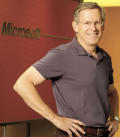This is a huge Month for IP in Seattle. There are 4 major Events happening between the 7th and the 28th:
13th Annual Intellectual Property Institute
Seattle University CLE on Software and Piracy
Washington State Patent Law Association CLE
Music in the New Millennium
I will be live blogging from both the 13th Annual IP Institute and the Music for the New Millennium event. I will be in New Orleans for the 2009 Nonprofit Technology Conference for the other two. If anyone is interested in attending and representing the FFIP / Free Culture point of view and would like to blog about it please contact me (Brian at freedomforip.org). I will also be adding these events to the FFIP Google calendar (Along with the NOLA conference).
13th Annual Intellectual Property Institute
Date: March 7th
Event: IP Conference
Location: WA Convention Center
Cost: $225 GA, $100 for first 20 students
Speakers:
20 plus Highlights include:
Joseph Miller, Lewis and of Clark Law, speaking on recent supreme court cases
Bruce E.H. Johnson, Davis Wright Tremaine, speaking on Fair Use and the First Amendment
There is even a whole panel on Second Life and Online Liability!
The Intersection of Intellectual Property, Patent Law, and Software Piracy
Date: March 14th
Event: Software CLE
Location: Seattle University Law School
Speakers:
Judge James P. Donohue, Magistrate Judge, Western District of Washington
Katheryn Frierson, Assistant U.S. Attorney, Criminal Division, U.S. Attorney’s Office, Western District of Washington
William J. Harmon, Senior Attorney, Microsoft Corporation, Redmond, WA
Michael D. Stein, Partner-in-charge, Woodcock Washburn, Seattle, WA
Register Online for the SU Software Piracy CLE
Washington State Patent Law Association CLE
Date: March 19th
Event: Lunch CLE on Patents
Location: Washington Athletic Club, First Floor
Schedule
Registration 11:30 a.m.
WSPLA Business 11:55 a.m. – Noon (Please note early start)
Program and Lunch: Noon – 1:30 p.m. (Please note due to volume of material to cover, the Program will begin at noon sharp)
Cost: WSPLA Members $55 Students $35 Others: $75
Panelists:
-Dale R. Cook, Intellectual Ventures
-Scott R. Hayden, Amazon.com
-Jennifer K. Johnson, Zymogenetics
-Brian C. Park, Dorsey & Whitney
Cases Discussed:
SanDisk Corp. v. STMicroelectronics, Inc. (Federal Circuit repudiates “reasonable apprehension of suit” standard for patent declaratory judgment actions and might allow DJ actions in response to any invitation to license)
In re Comisky (Method claims that depend entirely on use of mental processes do not contain patentable subject matter)
In re Nuijten (Federal Circuit says electrical signal not a “manufacture” and therefore not patentable subject matter)
In re Seagate (Federal Circuit replaces duty of due care standard for avoiding enhanced damages with “objective recklessness” standard)
KSR Intl v. Teleflex (Supreme Court rejects rigid application of Federal Circuit’s “teaching, suggestion or motivation” test for obviousness)
Music in the New Millennium
Date: March 28th
Event: Future of Music panel talk
Location: Davis Wright Tremaine LLP, 1201 Third Ave, 22nd Floor Seattle Wa
Cost: Suggested contribution of $15 (law students are free).
Speakers:
Dave Dederer Lead singer of Presidents of the United States of America and VP of Content for Melodeo
Robert Sullivan, Music attorney for Johnny Cash, Randy Travis
Dan Sheeran, SVP RealNetworks
Online Registration


